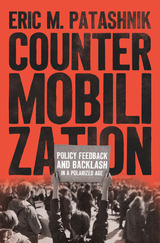354 start with G start with G
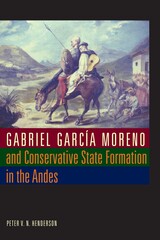
This book explores the life and times of Ecuador's most controversial politician within the broader context of the new political history, addressing five major themes of nineteenth-century Latin American history: the creation of political networks, the divisiveness of regionalism, the bitterness of the liberal-conservative ideological divide, the complicating problem of caudillismo, and the quest for progress and modernization.
Two myths traditionally associated with García Moreno's rule are debunked. The first is that he created a theocracy in Ecuador. Instead, the book argues that he negotiated a concordat with the Papacy giving the national government control over the church's secular responsibilities, and subordinated the clergy, many of whom were highly critical of García Moreno, to the conservative state. A second, frequently repeated generalization is that he created a conservative dictatorship out of touch with the liberal age in which he lived. Instead, the book argues that moderates held sway during the first nine years of García Moreno's period of influence, and only during his final term did he achieve the type of conservative state he thought necessary to advance his progressive nation-building agenda.
In sum, this book enriches our understanding of many of the notions of state formation by suggesting that conservatives like García Moreno envisioned a program of material progress and promoting national unity under a very different formula from that of nineteenth-century liberals.

With evidence from congressional hearings, personal interviews, oral histories, farm and trade journals, and newspapers, Hansen traces the evolution of farm lobby access in Congress. He chronicles the rise and fall of the American Farm Bureau, the surge and decline of party politics, the incoporation of the commodity lobbies, the exclusion of the consumer lobbies, and the accommodation of urban interests in food stamps.
Brilliantly combining insights from rational choice theory with historical data, Gaining Access is an essential guide for anyone interested in the dynamics of interest group influence.


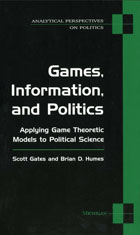

In the first decade of the twenty-first century, video games are an integral part of global media culture, rivaling Hollywood in revenue and influence. No longer confined to a subculture of adolescent males, video games today are played by adults around the world. At the same time, video games have become major sites of corporate exploitation and military recruitment.
In Games of Empire, Nick Dyer-Witheford and Greig de Peuter offer a radical political critique of such video games and virtual environments as Second Life, World of Warcraft, and Grand Theft Auto, analyzing them as the exemplary media of Empire, the twenty-first-century hypercapitalist complex theorized by Michael Hardt and Antonio Negri. The authors trace the ascent of virtual gaming, assess its impact on creators and players alike, and delineate the relationships between games and reality, body and avatar, screen and street.
Games of Empire forcefully connects video games to real-world concerns about globalization, militarism, and exploitation, from the horrors of African mines and Indian e-waste sites that underlie the entire industry, the role of labor in commercial game development, and the synergy between military simulation software and the battlefields of Iraq and Afghanistan exemplified by Full Spectrum Warrior to the substantial virtual economies surrounding World of Warcraft, the urban neoliberalism made playable in Grand Theft Auto, and the emergence of an alternative game culture through activist games and open-source game development.
Rejecting both moral panic and glib enthusiasm, Games of Empire demonstrates how virtual games crystallize the cultural, political, and economic forces of global capital, while also providing a means of resisting them.

"Frank C. Zagare combines a deep command of historical scholarship and the sophisticated skills of an applied game theorist to develop and test a theory of why deterrence failed, catastrophically, in July 1914. . . . Zagare concludes with sage advice on how to avoid even more cataclysmic breakdowns in a nuclear world."
---Steven J. Brams, New York University
"Zagare's deft study of the origins of the First World War using his perfect deterrence theory uncovers new insights into that signal event and shows the value of formal theory applied to historical events. A must-read for those interested in security studies."
---James D. Morrow, University of Michigan
"Through an exemplary combination of formal theory, careful qualitative analysis, and lucid prose, The Games of July delivers important and interesting answers to key questions concerning the international political causes of World War I. Its well-formed narratives and its sustained engagement with leading works in IR and diplomatic history . . . make it a rewarding read for security scholars in general and a useful teaching tool for international security courses."
---Timothy W. Crawford, Boston College
Taking advantage of recent advances in game theory and the latest historiography, Frank C. Zagare offers a new, provocative interpretation of the events that led to the outbreak of World War I. He analyzes key events from Bismarck's surprising decision in 1879 to enter into a strategic alliance with Austria-Hungary to the escalation that culminated in a full-scale global war. Zagare concludes that, while the war was most certainly unintended, it was in no sense accidental or inevitable.
The Games of July serves not only as an analytical narrative but also as a work of theoretical assessment. Standard realist and liberal explanations of the Great War are evaluated along with a collection of game-theoretic models known as perfect deterrence theory.
Frank C. Zagare is UB Distinguished Professor of Political Science at the State University of New York at Buffalo.
Cover illustration: Satirical Italian postcard from World War I. Used with permission from The University of North Carolina at Chapel Hill Libraries.
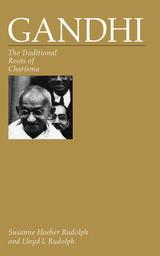
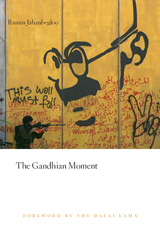
Gandhi is revered as a historic leader, the father of Indian independence, and the inspiration for nonviolent protest around the world. But the importance of these practical achievements has obscured Gandhi’s stature as an extraordinarily innovative political thinker. Ramin Jahanbegloo presents Gandhi the political theorist—the intellectual founder of a system predicated on the power of nonviolence to challenge state sovereignty and domination. A philosopher and an activist in his own right, Jahanbegloo guides us through Gandhi’s core ideas, shows how they shaped political protest from 1960s America to the fall of the Berlin Wall and beyond, and calls for their use today by Muslims demanding change.
Gandhi challenged mainstream political ideas most forcefully on sovereignty. He argued that state power is not legitimate simply when it commands general support or because it protects us from anarchy. Instead, legitimacy depends on the consent of dutiful citizens willing to challenge the state nonviolently when it acts immorally. The culmination of the inner struggle to recognize one’s duty to act, Jahanbegloo says, is the ultimate “Gandhian moment.”
Gandhi’s ideas have motivated such famous figures as Martin Luther King, Nelson Mandela, and the Dalai Lama. As Jahanbegloo demonstrates, they also inspired the unheralded Muslim activists Abul Kalam Azad and Khan Abdul Ghaffar Khan, whose work for Indian independence answers those today who doubt the viability of nonviolent Islamic protest. The book is a powerful reminder of Gandhi’s enduring political relevance and a pioneering account of his extraordinary intellectual achievements.


Winner of the 2018 Bronze Current Events Book Award from the Independent Publisher Book Awards
Generations ago, gambling in America was an illicit activity, dominated by gangsters like Benny Binion and Bugsy Siegel. Today, forty-eight out of fifty states permit some form of legal gambling, and America’s governors sit at the head of the gaming table. But have states become addicted to the revenue gambling can bring? And does the potential of increased revenue lead them to place risky bets on new casinos, lotteries, and online games?
In Gangsters to Governors, journalist David Clary investigates the pros and cons of the shift toward state-run gambling. Unearthing the sordid history of America’s gaming underground, he demonstrates the problems with prohibiting gambling while revealing how today’s governors, all competing for a piece of the action, promise their citizens payouts that are rarely delivered.
Clary introduces us to a rogue’s gallery of colorful characters, from John “Old Smoke” Morrissey, the Irish-born gangster who built Saratoga into a gambling haven in the nineteenth century, to Sheldon Adelson, the billionaire casino magnate who has furiously lobbied against online betting. By exploring the controversial histories of legal and illegal gambling in America, he offers a fresh perspective on current controversies, including bans on sports and online betting. Entertaining and thought-provoking, Gangsters to Governors considers the past, present, and future of our gambling nation.
Author's website (http://www.davidclaryauthor.com)
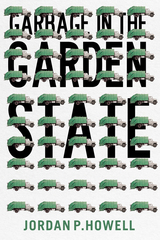
Howell acknowledges that New Jersey is sometimes imagined, particularly by non-New Jerseyans, as a giant garbage dump for New York and Philadelphia. But every place has had to struggle with the challenges of waste management. New Jersey's trash history is in fact more interesting and more important than most. New Jersey’s waste history includes intensive planning, deep-seated political conflict, organized crime, and literally every level of state and federal judiciary. It is a colorful history, to say the least, and one that includes a number of firsts with regard to recycling, comprehensive planning, and the challenging economics of trash.
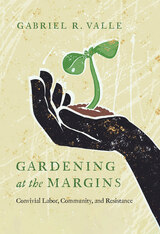
Participants in La Mesa Verde home garden program engage in the practices of growing and sharing food to envision and continuously work to enact alternative food systems that connect people to their food and communities. They are building on ancestral knowledge, as well as learning new forms of farming, gardening, and healing through convivial acts of sharing.
The individuals featured in the book are imagining and building alternative worlds and futures amid the very real challenges they embody and endure. Climate change, for example, is forcing thousands of migrants to urban areas, which means recent immigrants’ traditional environmental, nutritional, and healing knowledge will continue to be threatened by the pervasiveness of modernity and the homogenization of global capitalism. Moreover, once rural people migrate to urban areas, their ability to retain traditional foodways will remain difficult without spaces of autonomy. The stories in this book reveal how people create the physical space to grow food and the political space to enact autonomy to revive and restore agroecological knowledge needed for an uncertain future.


This was the gist of the letter that Dominion Energy sent to thousands of residents living along the path of its proposed Atlantic Coast Pipeline in 2014, setting off an epic, six-year battle that eventually led all the way to the Supreme Court. That struggle’s epicenter was in the mountains of Virginia, where communities stretching from the Blue Ridge foothills to the Shenandoah Valley and the Allegheny highlands became Dominion’s staunchest foes. On one side was an archetypal Goliath: a power company that commands billions of dollars, the votes of politicians, and the decisions of the federal government. On the other, an army of Davids: lawyers and farmers, conservationists and conservatives, scientists and nurses, innkeepers and lobbyists, families who farmed their land since before the Revolutionary War and those who were not allowed to until after the Civil War.
At stake was not only the future of the communities that lay in the pipeline’s path but the future of American energy. Would the public be swayed by the industry’s decades-long public relations campaign to frame natural gas – a fossil fuel and itself a potent greenhouse gas – as a “solution” to climate change? Or would we recognize it as a methane bomb, capable of not only imperiling local property and upending people’s lives, but of pushing the planet further down the road towards climate chaos?
Vivid and suspenseful, gut-wrenching and insightful, Gaslight is more than the chronicle of a turning point in American history. It is essential reading for anyone who wants to understand the dark, overlooked story of America’s “favorite fossil fuel,” and the immense future stakes of the energy choices we face today.

The passage of the anti-gay marriage Proposition 8 in California in 2008 stunned gay rights activists across the country. Although facing a well-funded campaign in support of the ballot measure, LGBT activists had good reasons for optimism, including the size and strength of their campaign. Since 1974, the LGBT movement has fought 146 anti-gay ballot initiatives sponsored by the religious right and has developed innovative strategies to oppose these measures. In Gay Rights at the Ballot Box, Amy L. Stone examines how the tactics of LGBT activists have evolved and unravels the complex relationship between ballot measure campaigns and the broader goals of the LGBT movement.
The first comprehensive history of anti-gay ballot measures, both those merely attempted and those successfully put before voters, this book draws on archival research and interviews with more than one hundred LGBT activists to provide a detailed account of the campaigns to stop such ballot measures from passing into law. As Stone shows through in-depth case studies, although LGBT activists lost the vast majority of these fights, they also won significant statewide victories in Oregon in 1992 and Arizona in 2006, and local successes, including ones in Ypsilanti, Michigan, in 1998 and 2002.
Stone analyzes how LGBT activists constantly refined their campaign tactics in response to both victories and defeats. She also stresses that such campaigns have played both a complementary and contradictory role within the LGBT movement. Specific anti-ballot campaigns and the broader movement do often strengthen each other. However, ballot measure campaigns sometimes distract activists from the movement’s more general goals, and activists at the movement level can pressure local campaigns to take on more than they can handle. With gay rights coming under increasing assault from the religious right, this book is a vital resource for LGBT activists and others working to block their efforts.

Contributors. Nayrouz Abu Hatoum, Shahd Abusalama, Samirah Alkassim, Basma Alsharif, Hadeel Assali, Azza El-Hassan, Hatim El-Hibri, Mohamed Jabaly, Ahmed Mansour, Arab Nasser, Tarzan Nasser, Kamran Rastegar, Viviane Saglier, Abdelsalam Shehada, Yaron Shemer, Rebecca L. Stein, Helga Tawil-Souri, Shaira Vadasaria, Nadia Yaqub
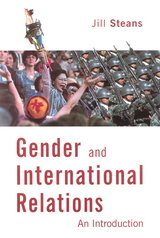
Until relatively recently, little had been written about gender issues in international relations despite the increased importance of the study of gender in other areas of the social sciences. Gender and International Relations fills that gap, providing a clear and accessible guide to the study of gender issues, feminist theories, and international relations. Steans illustrates how gender is central to nationalisms and political identity, the state, citizenship and conceptions of political community, security, and global political economy and development. Drawing on feminist scholarship from across the social sciences, she demonstrates the uses of feminism as critique. She also introduces readers to contemporary theoretical debates in international relations using concrete concerns and easily understandable issues to ground the discussion.
The book does not construct a single feminist theory of international relations nor does it advance a particular perspective of how gender can best be understood in an international or global context. Rather, the book argues that feminist theories have collectively produced insights crucial to the study of international relations and that these insights can be used to challenge conventional approaches to the discipline.

Until relatively recently, little had been written about gender issues in international relations despite the increased importance of the study of gender in other areas of the social sciences. Gender and International Relations fills that gap, providing a clear and accessible guide to the study of gender issues, feminist theories, and international relations. Steans illustrates how gender is central to nationalisms and political identity, the state, citizenship and conceptions of political community, security, and global political economy and development. Drawing on feminist scholarship from across the social sciences, she demonstrates the uses of feminism as critique. She also introduces readers to contemporary theoretical debates in international relations using concrete concerns and easily understandable issues to ground the discussion.
The book does not construct a single feminist theory of international relations nor does it advance a particular perspective of how gender can best be understood in an international or global context. Rather, the book argues that feminist theories have collectively produced insights crucial to the study of international relations and that these insights can be used to challenge conventional approaches to the discipline.
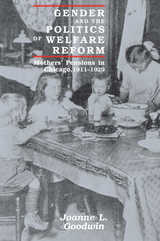
This revealing study shows how assumptions about women's roles have historically shaped public policy and sheds new light on the ongoing controversy of welfare reform.
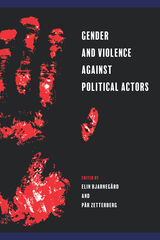
Chapters focus on theoretical approaches demonstrating how different disciplinary starting points—e.g., politics, violence and gender—give rise to different lenses. Essays examine violence carried out during conflict and peacetime, and relate to the continuum of violence—physical, sexual, psychological, and online. In addition, six country case studies reveal how different types of political actors have been targets of violence.
Gender and Violence against Political Actors ends by providing various approaches to responding to the problem of gendered violence in politics while also evaluating policy responses.
Contributors: Kerryn Baker, Julie Ballington, Gabrielle Bardall, Gabriella Borovsky, Cheryl N. Collier, Sofia Collignon, Maria Eriksson Baaz, Eleonora Esposito, Nicole Haley, Rebekah Herrick, Sandra Håkansson, Roudabeh Kishi, Anne-Kathrin Kreft, Mona Lena Krook, Rebecca Kuperberg, Robert U. Nagel, Louise Olsson, Jennifer M. Piscopo, Tracey Raney, Juliana Restrepo Sanín, Paige Schneider, Maria Stern, Sue Thomas, and the editors

Gender and Violence in Haiti is the product of more than a year of extensive firsthand observations and interviews with the women who have been caught up in the widespread violence plaguing Haiti. Drawing from the experiences of a diverse group of Haitian women, Faedi Duramy finds that both the victims and perpetrators of violence share a common sense of anger and desperation. Untangling the many factors that cause these women to commit violence, from self-defense to revenge, she identifies concrete measures that can lead them to feel vindicated and protected by their communities.
Faedi Duramy vividly conveys the horrifying conditions pervading Haiti, even before the 2010 earthquake. But Gender and Violence in Haiti also carries a message of hope—and shows what local authorities and international relief agencies can do to help the women of Haiti.
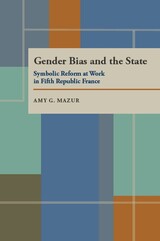
This is the first systematic study of French policy regarding equal employment for women. Mazur asks why policy makers choose to make symbolic reforms. Is there a certain set of conditions particularly conducive to the formation of symbolic reform? If symbolic reforms are meant to do nothing, why do governments allocate limited resources to them?
Mazur examines five legislative proposals, dating from 1967 to 1982, three of which resulted in legislation: the 1972 Equal Pay Law. the 1975 Equal Treatment Law, and the 1983 Egalité Professionelle Law. These five case studies reveal the continuity over three decades of “symbolic” reform, reform that does not solve the problem it was designed to address.
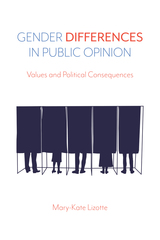
In this era in which more women are running for public office—and when there is increased activism among women—understanding gender differences on political issues has become critical. In her cogent study, Mary-Kate Lizotte argues that assessing the gender gap in public support for policies through a values lens provides insight into American politics today. There is ample evidence that men and women differ in their value endorsements—even when taking into account factors such as education, class, race, income, and party identification.
In Gender Differences in Public Opinion, Lizotte utilizes nationally representative data, mainly from the American National Election Study, to study these gender gaps, the explanatory power of values, and the political consequences of these differences. She examines the gender differences in several policy areas such as equal rights, gun control, the death penalty, and the environment, as well as social welfare issues. The result is an insightful and revealing study of how men and women vary in their policy positions and political attitudes.
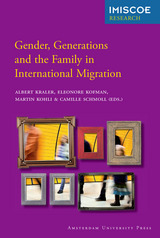
Family-related migration is moving to the center of political debates on migration, integration, and multiculturalism in Europe. Still, strands of academic research on family migrations and migrant families remain separate from—and sometimes ignorant of—each other. This volume seeks to bridge the disciplinary divide. Collectively, the authors address the need to better understand the diversity of family-related migration and its resulting family forms and practices, to question simplistic assumptions about migrant families in public discourse, to study family migration from a mix of disciplinary perspectives, and to acknowledge the state’s role in shaping family-related migration, practices, and lives.


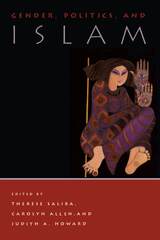
This collection shows Islam to be a diverse set of variable practices and beliefs shaped by region, nation, ethnicity, sect, and class, as well as by responses to many cultural and economic processes. In examining women's participation in religious and nationalist projects, these critics debate controversial issues: Does Islamic feminism provide an alternative, revolutionary paradigm to Eurocentric liberal humanism and western feminism? Is Islam more oppressive to women than the modern secular state? How are the lives and texts of Arab and Muslim women constructed for local or western consumption? These essays expose the shortcomings of the secularist assumptions of many recent feminist analyses, which continue to treat religion in general and fundamentalism in particular as a tool of oppression used against women, rather than as a viable form of feminist agency producing contradictory effects for its participants.
The essays in this book first appeared in Signs: Journal of Women in Culture and Society.
Contributors:
S. M. Shamsul Alam
Amal Amireh
Mary Elaine Heglund
Shahnaz Khan
Anouar Majid
Val Moghadam
Julia Peteet
Elora Shehabbudin
Gabriele vom Bruck.

Essays reveal the multiplicity of ways "compulsory masculinity" is imposed upon female leaders who wish to succeed in a man's world, and analyzes the use of interpersonal means to ensure masculine advantage. For example, only one woman in Congress was able to have a direct effect on any reproductive policy; other women experienced sexual harassment by offensive men, which resulted in their being distracted from performing as leaders.
Until now, studies of gender within the field of political science have focused centrally on women. Men have been studied as gendered beings whose thinking has shaped politics in ways advantageous to them, but this volume is unique in crossing multiple levels of analysis and demonstrating the interactive and reinforcing effects of gender power. The book is required reading for political scientists who have frequently been blind to masculinist assumptions and cultural belief systems when gender roles collide with leadership demands for women. It will also appeal to those in public administration and policy, sociology, and business studies.
"An important book that challenges the ways empirical research is done and the ways social scientists think about gender."--Nancy Hartsock, University of Washington
"A very useful book on gender and political leadership that weaves together scholarly research with practical applications and suggestions for change."--Virginia Sapiro, University of Wisconsin, Madison
"A very ambitious book, attempting no less than a paradigm shift in social science thinking."--Marcia Lynn Whicker, Rutgers University
Georgia Duerst-Lahti is Associate Dean and Associate Professor of Government, Beloit College. Rita Mae Kelly is Director and Chair of the School of Justice Studies, and Professor of Justice Studies, Political Science, and Women's Studies, Arizona State University.
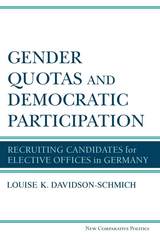
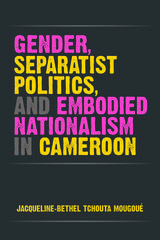
Gender, Separatist Politics, and Embodied Nationalism in Cameroon illuminates how issues of ideal womanhood shaped the Anglophone Cameroonian nationalist movement in the first decade of independence in Cameroon, a west-central African country. Drawing upon history, political science, gender studies, and feminist epistemologies, the book examines how formally educated women sought to protect the cultural values and the self-determination of the Anglophone Cameroonian state as Francophone Cameroon prepared to dismantle the federal republic. The book defines and uses the concept of embodied nationalism to illustrate the political importance of women’s everyday behavior—the clothes they wore, the foods they cooked, whether they gossiped, and their deference to their husbands. The result, in this fascinating approach, reveals that West Cameroon, which included English-speaking areas, was a progressive and autonomous nation. The author’s sources include oral interviews and archival records such as women’s newspaper advice columns, Cameroon’s first cooking book, and the first novel published by an Anglophone Cameroonian woman.
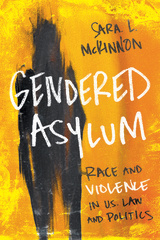
Sara L. McKinnon exposes racialized rhetorics of violence in politics and charts the development of gender as a category in American asylum law. Starting with the late 1980s, when gender-based requests first emerged in case law, McKinnon analyzes gender- and sexuality-related cases against the backdrop of national and transnational politics. Her focus falls on cases as diverse as Guatemalan and Salvadoran women sexually abused during the Dirty Wars and transgender asylum seekers from around the world fleeing brutally violent situations. She reviews the claims, evidence, testimony, and message strategies that unfolded in these legal arguments and decisions, and illuminates how legal decisions turned gender into a political construct vulnerable to American national and global interests. She also explores myriad related aspects of the process, including how subjects are racialized and the effects of that racialization, and the consequences of policies that position gender as a signifier for women via normative assumptions about sex and heterosexuality.
Wide-ranging and rich with human detail, Gendered Asylum uses feminist, immigration, and legal studies to engage one of the hotly debated issues of our time.
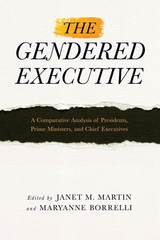
Excluded from the ranks of elite executive decision-makers for generations, women are now exercising power as chiefs of government and chiefs of state. As of April 2016, 112 women in 73 countries have served as presidents or prime ministers.
The Gendered Executive is a critical examination of national executives, focusing on matters of identity, representation, and power. The editors and contributors to this volume address the impact of female executives through political mobilization and participation, policy- and decision-making, and institutional change. Other topics include party nomination processes, the intersectionality of race and gender, and women-centered U.S. foreign policy in southern Africa. In addition, case studies from Chile, India, Portugal, and the United States are presented, as are cross-national comparisons of women leaders in Latin America.
The Gendered Executive will enhance our understanding of the complexity of gender in and comparative analyses of executive politics.
Contributors include: Amy C. Alexander, Sheetal Chhabria, Georgia Duerst-Lahti, Maria C. Escobar-Lemmon, Cory Charles Gooding, Lilly Goren, Karen M. Hult, Farida Jalalzai, Daniela F. Melo, Catherine Reyes-Housholder, Ariella R. Rotramel, Leslie A. Schwindt-Bayer, Michelle M. Taylor-Robinson, and the editors
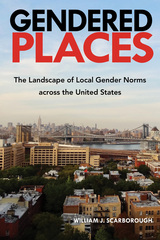
Every place has its quirky attributes, cultural reputation, and distinctive flair. But when we travel across America, do we also experience distinct gender norms and expectations? In his groundbreaking Gendered Places, William Scarborough examines metropolitan commuting zones to see how each region’s local culture reflects gender roles and gender equity. He uses surveys and social media data to measure multiple dimensions of gender norms, including expectations toward women in leadership, attitudes toward working mothers, as well as the division of household labor.
Gendered Places reveals that different locations, even within the same region of the country, such as Milwaukee and Madison Wisconsin, have distinct gender norms and highly influential cultural environments. Scarboroughshows how these local norms shape the attitudes and behaviors of residents with implications on patterns of inequality such as the gender wage gap. His findings offer valuable insight for community leaders and organizers making efforts to promote equality in their region.
Scarboroughrecognizes local culture as not value-neutral, but highly crucial to the gender structure that perpetuates, or challenges, gender inequality. Gendered Places questions how these gender norms are sustained and their social consequences.
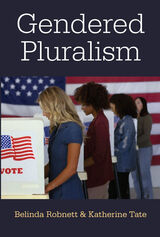
Focused on structural and political intersectionalities, Gendered Pluralism takes a broader approach to understanding the constellation of factors that drive gender and racial differences on an array of public policy issues. Belinda Robnett and Katherine Tate examine a broader set of actors absent the contextual factors that may drive them to compromise their opinions. Their study examines the ways in which (1) men and women differ on public policy issues and the factors that drive these differences; (2) whites and racial-ethnic minorities differ on public policy issues and the factors that drive these differences; (3) women differ on public policy issues and the factors that drive these differences; (4) African-American men and women differ on public policy issues and the factors that drive these differences; and (5) African-American women differ on public policy issues and the factors that drive these differences.
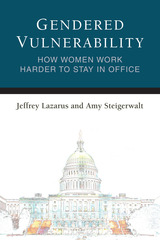
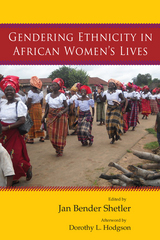
Drawing on extensive field research in many different regions of Africa, the contributors demonstrate in their essays that women do make choices about the forms of ethnicity they embrace, creating alternatives to male-centered definitions—in some cases rejecting a specific ethnic identity in favor of an interethnic alliance, in others reinterpreting the meaning of ethnicity within gendered domains, and in others performing ethnic power in gendered ways. Their analysis helps explain why African women may be more likely to champion interethnic political movements while men often promote an ethnicity based on martial masculinity. Bringing together anthropologists, historians, linguists, and political scientists, Gendering Ethnicity in African Women’s Lives offers a diverse and timely look at a neglected but important topic.
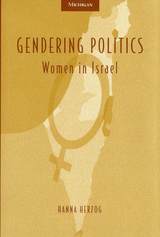
Gendering Politics explores the place of women in democratic politics by means of a detailed study of women in Israeli politics who were elected to municipal councils from 1950 to 1989. Drawing from a variety of sources, including questionnaires, interviews, newspaper coverage, and existing statistical data, as well as examinations of studies of the role of women in politics in other democracies, Herzog analyzes the extent of success and failure of women in Israeli elections. She then explores reasons why female participation in Israeli politics has been relatively slight, despite historical precedents and social circumstances that would indicate otherwise.
The author examines the gendered bias of the power structure as it is shaped by basic cultural organizing principles. She exposes hidden assumptions--and notes the overt assumptions--which by definition exclude women from politics. The author also looks at the structure of opportunities within the prevailing political system, uncovering the relevant blocking and facilitating elements.
Gendering Politics will be of interest to students and scholars of women's studies, Israeli studies, political sociology, and political science.
Hanna Herzog is Associate Professor of Sociology, Tel Aviv University.
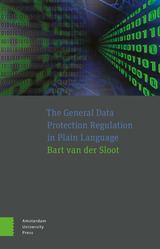
This book sets out the most important obligations of individuals and organisations that process data about others. These include taking technical security measures, carrying out an impact assessment and registering all data-processing procedures within an organisation. It also discusses the rights of citizens whose data are processed, such as the right to be forgotten, the right to information and the right to data portability.
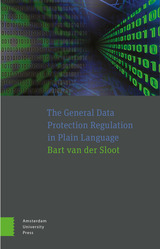


The unique model of apartheid, colonisation and military occupation that Israel imposes on the Palestinians, along with myriad violations of international law, have made Palestine the moral cause of a generation. Yet many people continue to ask, ‘what can we do?’
Generation Palestine helps to answer this question by bringing together Palestinian and international activists in the Boycott, Divestment and Sanctions (BDS) movement. The movement aims to pressure Israel until it complies with International Law, mirroring the model that was successfully utilised against South African apartheid.
With essays written by a wide selection of contributors, Generation Palestine follows the BDS movement’s model of inclusivity and collaboration. Contributors include Archbishop Desmond Tutu, Ken Loach, Iain Banks, Ronnie Kasrils, Professor Richard Falk, Ilan Pappe, Omar Barghouti, Ramzy Baroud and Archbishop Attallah Hannah, alongside other internationally acclaimed artists, writers, academics and grassroots activists.
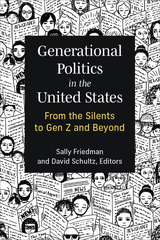
Generational Politics in the United States is the first comprehensive book that examines the concept of generations from a political science perspective. It defines what a generation is and how to sort out the differences between life cycle, cohort, and aging effect. The book then brings together chapters from an array of political science scholars that examine the role of generations in American politics and how it relates to other variables such as age, race, gender, and socioeconomic status. It discusses how politics in the United States are impacted by changes in generations, including how the passing of the Baby Boom generation and rise of the Millennials and Gen Z will change American politics. By examining the differences in political attitudes, engagement, and impact of recent generations, Generational Politics in the United States suggests how generational change will impact American politics in the future.

Comparing her native Norway to Western Europe and the United States, Wikan focuses on people caught in turmoil, how institutions function, and the ways in which public opinion is shaped and state policies determined. Contradictions arise between policies of respect for minority cultures, welfare, and freedom, but the goal is the same: to create a society committed to both social justice and respect for human rights.
Writing with power and grace, Wikan makes a plea for a renewed moral vitality and human empathy that can pave the way for more effective social policies and create change.
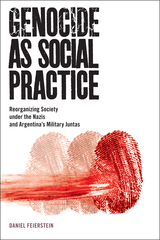
The Nazis resorted to ruthless methods in part to stifle dissent but even more importantly to reorganize German society into a Volksgemeinschaft, or people’s community, in which racial solidarity would supposedly replace class struggle. The situation in Argentina echoes this. After seizing power in 1976, the Argentine military described its own program of forced disappearances, torture, and murder as a “process of national reorganization” aimed at remodeling society on “Western and Christian” lines.
For Feierstein, genocide can be considered a technology of power—a form of social engineering—that creates, destroys, or reorganizes relationships within a given society. It influences the ways in which different social groups construct their identity and the identity of others, thus shaping the way that groups interrelate. Feierstein establishes continuity between the “reorganizing genocide” first practiced by the Nazis in concentration camps and the more complex version—complex in terms of the symbolic and material closure of social relationships —later applied in Argentina. In conclusion, he speculates on how to construct a political culture capable of confronting and resisting these trends.
First published in Argentina, in Spanish, Genocide as Social Practice has since been translated into many languages, now including this English edition. The book provides a distinctive and valuable look at genocide through the lens of Latin America as well as Europe.
Download open access ebook here.
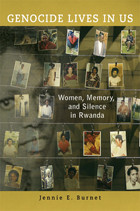
In the aftermath of the 1994 genocide, Rwandan women faced the impossible—resurrecting their lives amidst unthinkable devastation. Haunted by memories of lost loved ones and of their own experiences of violence, women rebuilt their lives from “less than nothing.” Neither passive victims nor innate peacemakers, they traversed dangerous emotional and political terrain to emerge as leaders in Rwanda today. This clear and engaging ethnography of survival tackles three interrelated phenomena—memory, silence, and justice—and probes the contradictory roles women played in postgenocide reconciliation.
Based on more than a decade of intensive fieldwork, Genocide Lives in Us provides a unique grassroots perspective on a postconflict society. Anthropologist Jennie E. Burnet relates with sensitivity the heart-wrenching survival stories of ordinary Rwandan women and uncovers political and historical themes in their personal narratives. She shows that women’s leading role in Rwanda’s renaissance resulted from several factors: the dire postgenocide situation that forced women into new roles; advocacy by the Rwandan women’s movement; and the inclusion of women in the postgenocide government.
Honorable Mention, Aidoo-Snyder Book Prize, Women’s Caucus of the African Studies Association
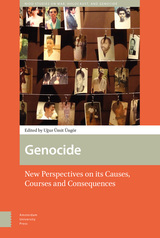
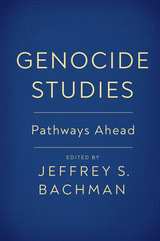
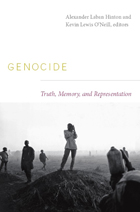
Specialists on the societies about which they write, these anthropologists draw on ethnographic research to provide on-the-ground analyses of communities in the wake of mass brutality. They investigate how mass violence is described or remembered, and how those representations are altered by the attempts of others, from NGOs to governments, to assert “the truth” about outbreaks of violence. One contributor questions the neutrality of an international group monitoring violence in Sudan and the assumption that such groups are, at worst, benign. Another examines the consequences of how events, victims, and perpetrators are portrayed by the Rwandan government during the annual commemoration of that country’s genocide in 1994. Still another explores the silence around the deaths of between eighty and one hundred thousand people on Bali during Indonesia’s state-sponsored anticommunist violence of 1965–1966, a genocidal period that until recently was rarely referenced in tourist guidebooks, anthropological studies on Bali, or even among the Balinese themselves. Other contributors consider issues of political identity and legitimacy, coping, the media, and “ethnic cleansing.” Genocide: Truth, Memory, and Representation reveals the major contribution that cultural anthropologists can make to the study of genocide.
Contributors. Pamela Ballinger, Jennie E. Burnet, Conerly Casey, Elizabeth Drexler, Leslie Dwyer, Alexander Laban Hinton, Sharon E. Hutchinson, Uli Linke, Kevin Lewis O’Neill, Antonius C. G. M. Robben, Debra Rodman, Victoria Sanford

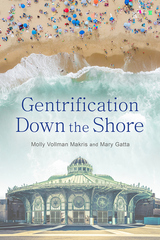
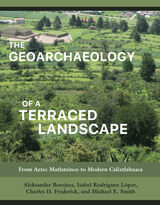
Working at a settlement in the Toluca Valley of central Mexico, the authors used fieldwalking, excavation, soil and artifact analyses, maps, aerial photos, land deeds, and litigation records to reconstruct the changing landscape through time. Exploiting the methodologies and techniques of several disciplines, they bring context to eight centuries of the region’s agrarian history, exploring the effects of the Aztec and Spanish Empires, reform, and revolution on the physical shape of the Mexican countryside and the livelihoods of its people. Accessible to specialists and nonspecialists alike, this well-illustrated and well-organized volume provides a step-by-step guide that can be applied to the study of terraced landscapes anywhere in the world.
The four authors share an interest in terraced landscapes and have worked together and on their own on a variety of archaeological projects in Mesoamerica, the Mediterranean, Poland, and the United Kingdom.

Geocultural Power explores this question by considering how China is couching its strategy for building trade, foreign relations, and energy and political security in an evocative topography of history. Until now Belt and Road has been discussed as a geopolitical and geoeconomic project. This book introduces geocultural power to the analysis of international affairs. Tim Winter highlights how many countries—including Iran, Sri Lanka, Kenya, Malaysia, Indonesia, Pakistan, and others—are revisiting their histories to find points of diplomatic and cultural connection. Through the revived Silk Roads, China becomes the new author of Eurasian history and the architect of the bridge between East and West. In a diplomatic dance of forgetting, episodes of violence, invasion, and bloodshed are left behind for a language of history and heritage that crosses borders in ways that further the trade ambitions of an increasingly networked China-driven economy.
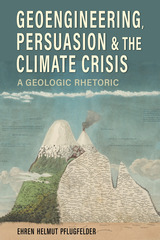
Geoengineering, Persuasion, and the Climate Crisis: A Geologic Rhetoric exposes the deeply worrying state of discourse over geoengineering—the intentional manipulation of the earth’s climate as means to halt or reverse global warming. These climate-altering projects, which range from cloud-whitening to carbon dioxide removal and from stratospheric aerosol injection to enhanced weathering, are all technological solutions to more complex geosocial problems.
Geoengineering represents one of the most alarming forms of deliberative discourse in the twenty-first century. Yet geoengineering could easily generate as much harm as the environmental traumas it seeks to cure. Complicating these deliberations is the scarcity of public discussion. Most deliberations transpire within policy groups, behind the closed doors of climate-oriented startups, between subject-matter experts at scientific conferences, or in the disciplinary jargon of research journals. Further, much of this conversation occurs primarily in the West.
Ehren Helmut Pflugfelder makes clear how the deliberative rhetorical strategies coming from geoengineering advocates have been largely deceptive, hegemonic, deterministic, and exploitative. In this volume, he investigates how geoengineering proponents marshal geologic actors into their arguments—and how current discourse could lead to a greater exploitation of the earth in the future.
Pflugfelder’s goal is to understand the structure, content, purpose, and effect of these discourses, raise the alarm about their deliberative directions, and help us rethink our approach to the climate. In highlighting both the inherent problems of the discourses and the ways geologic rhetoric can be made productive, he attempts to give “the geologic” a place at the table to better understand the roles that all earth systems continue to play in our lives, now and for years to come.
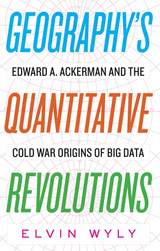
Do you have a smartphone? Billions of people on the planet now navigate their daily lives with the kind of advanced Global Positioning System capabilities once reserved for the most secretive elements of America’s military-industrial complex. But when so many people have access to the most powerful technologies humanity has ever devised for the precise determination of geographical coordinates, do we still need a specialized field of knowledge called geography?
Just as big data and artificial intelligence promise to automate occupations ranging from customer service and truck driving to stock trading and financial analysis, our age of algorithmic efficiency seems to eliminate the need for humans who call themselves geographers—at the precise moment when engaging with information about the peoples, places, and environments of a diverse world is more popular than ever before. How did we get here? This book traces the recent history of geography, information, and technology through the biography of Edward A. Ackerman, an important but forgotten figure in geography’s “quantitative revolution.” It argues that Ackerman’s work helped encode the hidden logics of a distorted philosophical heritage—a dangerous, cybernetic form of thought known as militant neo-Kantianism—into the network architectures of today’s pervasive worlds of surveillance capitalism.
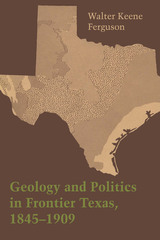
Conservation and development of natural resources are issues of critical importance throughout the world. These issues have been matters of public concern in Texas since legislators first adopted the state-sponsored geological survey as a means of extending government funds to private citizens who would help develop and advertise the mineral and agricultural wealth of Texas.
Walter Keene Ferguson examines the relation of politics to geological exploration during a critical period in Texas history—the first half-century of statehood. Although Texas shared its frontier experience with many other areas, it could not rely on federal aid in the form of land grants because the state government controlled the destiny of the public domain at all times. Acrimonious debate between farmers and urbanites of East Texas and pioneer ranchers of arid West Texas rendered the disposition of public lands even more difficult.
As tools for developing and advertising resources, the geological and agricultural surveys of 1858 and 1867 fulfilled the demands of expectant capitalism made by politicians, speculators, and railroad entrepreneurs. Reconnaissance geologists publicized the wealth of Texas.
Drought in 1886 and popular agitation against squandering of state land caused the emergence of a new concept of the geological survey as an instrument of land reform and public assistance. Lobbying by reformers and scientific organizations led to the formation of the Dumble Survey in 1888 and the University of Texas Mineral Survey in 1901. Stratigraphic analysis of the “individualities” of Texas geology helped the state realize its full economic potential and led to legislation to protect public mineral land from exploitation.
The youthful oil industry finally removed geological exploration from the political arena. As part of the University, a permanent Bureau of Economic Geology was established in 1909 to extend the benefits of scientific research to private citizens and state organizations on a nonpartisan basis.
Ferguson’s analysis of geological surveys in Texas contributes to an understanding not only of the geology and history of the state but of the urgent problem of evaluating the natural resources of underdeveloped regions.

Geopolitical Economy radically reinterprets the historical evolution of the world order, as a multi-polar world emerges from the dust of the financial and economic crisis.
Radhika Desai offers a radical critique of the theories of US hegemony, globalisation and empire which dominate academic international political economy and international relations, revealing their ideological origins in successive failed US attempts at world dominance through the dollar.
Desai revitalizes revolutionary intellectual traditions which combine class and national perspectives on ‘the relations of producing nations’. At a time of global upheavals and profound shifts in the distribution of world power, Geopolitical Economy forges a vivid and compelling account of the historical processes which are shaping the contemporary international order.
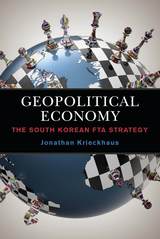
Geopolitical Economy examines the significance and nature of free trade agreements (FTAs), the primary policy tool through which modern nations seek access to international markets and promote economic growth. The book focuses specifically on how South Korea, the world’s leader in the number and significance of FTAs as well as the world’s sixth largest export economy, uses FTAs.
Jonathan Krieckhaus argues that geopolitics—the struggle between powerful nations over specific geographic regions around the globe—influenced FTA strategy and economic policy in South Korea and beyond. This perspective illustrates the security approach to FTAs, but adds that the geographic specificity of security concerns deeply shape FTA policy.
Geopolitical Economy also looks at Korean FTAs through the lens of development strategy. South Korea is singularly successful in garnering FTAs with all three players in the global economy: the United States, the European Union, and China. This unprecedented success was built on a strong commitment from three consecutive Korean presidential administrations, each operating within a favorable state-society context that enjoyed the existence of a centralized and effective trade bureaucracy.

Geopolitical Exotica examines exoticized Western representations of Tibet and Tibetans and the debate over that land’s status with regard to China. Concentrating on specific cultural images of the twentieth century—promulgated by novels, popular films, travelogues, and memoirs—Dibyesh Anand lays bare the strategies by which “Exotica Tibet” and “Tibetanness” have been constructed, and he investigates the impact these constructions have had on those who are being represented.
Although images of Tibet have excited the popular imagination in the West for many years, Geopolitical Exotica is the first book to explore representational practices within the study of international relations. Anand challenges the parochial practices of current mainstream international relations theory and practice, claiming that the discipline remains mostly Western in its orientation. His analysis of Tibet’s status with regard to China scrutinizes the vocabulary afforded by conventional international relations theory and considers issues that until now have been undertheorized in relation to Tibet, including imperialism, history, diaspora, representation, and identity.
In this masterfully synthetic work, Anand establishes that postcoloniality provides new insights into themes of representation and identity and demonstrates how IR as a discipline can meaningfully expand its focus beyond the West.
Dibyesh Anand is a reader in international relations at the University of Westminster, London.
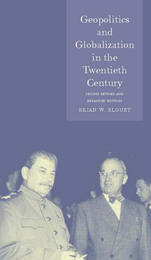
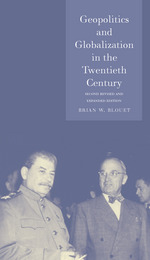
Geopolitics and Globalization in the Twentieth Century looks at the struggle between the processes of globalization and the forces of geopolitics over the last 150 years. The twentieth century witnessed conflicts between geopolitical states who wanted to close off and control land, resources, and population—like Nazi Germany and the former Soviet Union—and globalizing ones who wished to open up the world to the free flow of ideas, goods and services—like Britain and America. Geopolitics and Globalization describes and analyzes the tug-of-war between these two tendencies, the results of which have determined the shape and behavior of the world we live in today.
Beginning his survey in the late nineteenth century, Brian W. Blouet, in this revised and expanded second edition, brings his analysis up to the present day, when communication technologies are no longer land- or sea-based, and thus render globalization nearly inevitable.

Mary Gluck introduces us to a Lukács we have never met. Here is Lukács among his friends, lovers, and peers in those important years before 1918, when he converted to Communism and Marxism at the age of thirty-nine.
Georg Lukács claimed in later life that his early achievements lacked genuine coherence, being expressions of a vague "romantic anticapitalism" that only found resolution in his conversion to Marxism. By integrating Lukács with his early generational grouping and making expert use of a new treasure trove of documents from his early years, Gluck demonstrates that revolutionary socialism was not the inevitable outcome of Lukács' early cultural radicalism, but only one of several possible options in the fragmented ideological climate of postwar Europe. From this new perspective, his pre-Marxist career takes on a cultural consistency that parallels and illuminates the inner strivings of the early modernists before the outbreak of World War I.
Lukács emerges in this generational portrait not only as dramatic and psychologically complex but also as a representative figure whose inner dilemmas were echoed in the lives of many other radical intellectuals who came of age during the fin de siêcle period. Gluck situates Lukács within a fascinating network of friends and associates, the so-called Sunday Circle, which included such people as Karl Mannheim, Arnold Hauser, Bela Balázs, and Anna Lesznai. She adeptly anchors this group within the context of social and economic transformations in Hungary that brought new conservative, antisemitic movements to the fore and that marginalized the assimilated Jewish middle classes to which Lukács and most of his friends belonged. Retracing their collective hopes and values helps to clarify the far-ranging cultural crisis associated with the decline of nineteenth-century liberal culture and the emergence of the modernist sensibility.
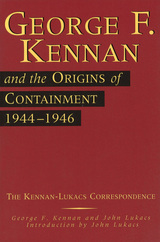
In 1945 the United States saw the Soviet Union as its principal ally. By 1947, it saw the Soviet Union as its principal opponent. How did this happen? Historian John Lukacs has provided an answer to this question through an exchange of letters with George F. Kennan. Their correspondence deals with the antecedents of containment between 1944 and 1946, during most of which time Kennan was at the American embassy in Moscow.
Kennan had strong opinions about America's appropriate role during and after World War II and is perhaps best known as the architect of America's containment policy. Much has been written about Kennan and containment, but relatively little is known about the events that made him compose and send the Long Telegram in 1946 that ultimately became the draft for foreign policy dealing with the Soviets in the following forty years.
These letters show Kennan's fear of the extent to which the United States misunderstood the Soviet regime. Especially in 1944, at the time of the Russians' betrayal of the Warsaw Uprising, it became evident that the Soviets were interested in establishing their rigid domination of Eastern and Central Europe and dividing the continent.
Kennan's letters to Lukacs are thorough and detailed, suggesting that the Truman administration was not in the least premature in opposing the Soviet Union. Indeed, both correspondents suggest that these decisions should have been made earlier. This series of letters will add greatly to our understanding of what preceded containment and the Cold War in 1947.
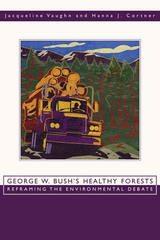
The authors show how the administration used news events such as wildfires to propel legislation through Congress. Focusing blame for wildfires on legal obstacles and environmentalists' use of appeals to challenge fuel-reduction projects, the administration restricted opportunities for environmental analysis, administrative appeals, and litigation. The authors argue that these tools have a history of use by diverse interests and have long protected Americans' right to question government decisions.
This readable study identifies the players, events, and strategies that expedited the policy shift and contextualizes it in the president's career and in legislative and administrative history. Revealing a policy change with major implications for the future of public lands and public process, George W. Bush's Healthy Forests will become required reading in environmental studies and political science.
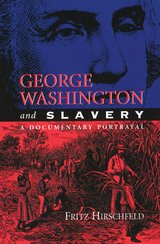
"I never mean (unless some particular circumstance should compel me to it) to possess another slave by purchase; it being among my first wishes to see some plan adopted, by which slavery in this country may be abolished by slow, sure and imperceptible degrees."—George Washington, September 9, 1786
No history of racism in America can be considered complete without taking into account the role that George Washington—the principal founding father—played in helping to mold the racist cast of the new nation. Because General Washington—the universally acknowledged hero of the Revolutionary War—in the postwar period uniquely combined the moral authority, personal prestige, and political power to influence significantly the course and the outcome of the slavery debate, his opinions on the subject of slaves and slavery are of crucial importance to understanding how racism succeeded in becoming an integral and official part of the national fabric during its formative stages.The successful end of the War for Independence in 1783 brought George Washington face-to-face with a fundamental dilemma: how to reconcile the proclaimed ideals of the revolution with the established institution of slavery. So long as black human beings in America could legally be considered the chattel property of whites, the rhetoric of equality and individual freedom was hollow. Progressive voices urged immediate emancipation as the only way to resolve the contradiction; the Southern slave owners, of course, stood firm for the status quo. Washington was caught squarely in the middle.
As a Virginia plantation proprietor and a lifelong slaveholder, Washington had a substantial private stake in the economic slave system of the South. However, in his role as the acknowledged political leader of the country, his overriding concern was the preservation of the Union. If Washington publicly supported emancipation, he would almost certainly have to set an example and take steps to dispose of his Mount Vernon slaves. If he spoke out on the side of slavery, how could he legitimately and conscientiously expect to uphold and defend the humanistic goals and moral imperatives of the new nation as expressed in the Declaration of Independence and embodied in the Constitution and the Bill of Rights? His was a balancing act that became more and more difficult to sustain with the passing years.
Relying primarily on Washington's own words—his correspondence, diaries, and other written records—supplemented by letters, comments, and eyewitness reports of family members, friends, employees, aides, correspondents, colleagues, and visitors to Mount Vernon, together with contemporary newspaper clippings and official documents pertaining to Washington's relationships with African Americans, Fritz Hirschfeld traces Washington's transition from a conventional slaveholder to a lukewarm abolitionist. George Washington and Slavery will be an essential addition to the historiography of eighteenth-century America and of Washington himself.

Treating Bataille's work as a whole rather than focusing, as other studies have done, on aspects of his work (i.e. as social theory or philosophy), Noys' study is intended to be sensitive to the needs of students new to Bataille's work while at the same time drawing on the latest research on Bataille to offer new interpretations of Bataille's oeuvre for more experienced readers. This is the first clear, introductory reading of Bataille in English - challenging current reductive readings, and stressing the range of disciplines affected by Bataille's work, at a time when interest in Bataille is growing.

According to a long-standing myth, once emigrants leave their homelands—particularly if they emigrate to the United States—they sever old nationalistic ties, assimilate, and happily live the American dream. In fact, many migrants remain intimately and integrally tied to their ancestral homeland, sometimes even after they become legal citizens of another country. In Georges Woke Up Laughing the authors reveal the realities and dilemmas that underlie the efforts of long-distance nationalists to redefine citizenship, race, nationality, and political loyalty. Through discussions of the history and economics that link the United States with countries around the world, Glick Schiller and Fouron highlight the forces that shape emigrants’ experiences of government and citizenship and create a transborder citizenry. Arguing that governments of many countries today have almost no power to implement policies that will assist their citizens, the authors provide insights into the ongoing sociological, anthropological, and political effects of globalization.
Georges Woke up Laughing will entertain and inform those who are concerned about the rights of people and the power of their governments within the globalizing economy.
“In my dream I was young and in Haiti with my friends, laughing, joking, and having a wonderful time. I was walking down the main street of my hometown of Aux Cayes. The sun was shining, the streets were clean, and the port was bustling with ships. At first I was laughing because of the feeling of happiness that stayed with me, even after I woke up. I tried to explain my wonderful dream to my wife, Rolande. Then I laughed again but this time not from joy. I had been dreaming of a Haiti that never was.”—from Georges Woke Up Laughing

In 2007 Georgetown University established the CyberProject under the auspices of the Institute for Law, Science & Global Security. The CyberProject seeks to hone the Institute’s resources to help policymakers develop a greater understanding of current international cybersecurity issues. On 10 April 2012, the Institute held its second annual international cyber conference entitled, “International Engagement on Cyber: Establishing International Norms & Improved Cyber Security.” Under the direction of the CyberProject and the Institute, we have devoted this second annual special issue of the Georgetown Journal of International Affairs to cyber exclusively, and the challenges that societies face as they seek to establish norms of behavior so all may coexist peacefully in this domain. In the pages that follow, participants from the Institute’s second international cyber conference and other leaders, domestic and foreign, lay out their visions for protecting cyberspace and maintaining its stability.
The Georgetown Journal of International Affairs is the official publication of the Edmund A. Walsh School of Foreign Service at Georgetown University. Each issue of the journal provides readers with a diverse array of timely, peer-reviewed content penned by top policymakers, business leaders, and academic luminaries. Annual peer reviewed ‘special editions’ feature collected academic analysis on rapidly changing domains within the arena of international affairs, including the International Engagement on Cyber series.

A great deal has transpired in the cyber realm during the past year. These events, particularly the Snowden Affair, have drastically shaped the debate over state power projection and its consequences. Global public discourse previously tended to center upon the Internet as a democratizing force, capable of weakening the control of the nation-state. The Internet transcended national borders and empowered the masses at the expense of traditional power blocks. However, this battle for the control of cyberspace is far from over. The nation-state is attempting to retrench its power in the digital realm, and the forces of centralization are appearing to gain strength in the struggle between diffusion and consolidation. This shift has raised serious questions regarding the responsibilities and limits of government cyber control. State Building on a New Frontier—the third edition of our annual International Engagement on Cyber series—attempts to explore some of these difficult themes. This edition also features articles that deal with the technical side of the cyber discussion, namely attempts to create appropriate standards for continuing infrastructure development.
The Georgetown Journal of International Affairs is the official publication of the Edmund A. Walsh School of Foreign Service at Georgetown University. Each issue of the journal provides readers with a diverse array of timely, peer-reviewed content penned by top policymakers, business leaders, and academic luminaries. Annual peer reviewed ‘special editions’ feature collected academic analysis on rapidly changing domains within the arena of international affairs, including the International Engagement on Cyber series.
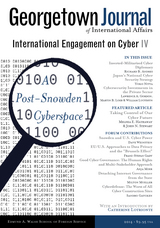
Each spring, the Cyber Project at Georgetown University’s Institute for Law, Science, and Global Security convenes a conference of leading international experts from academia, the private sector, and government to address cutting-edge issues in cybersecurity.
This issue begins with a group of articles under the theme A Post-Snowden Cyberspace, describing how Edward Snowden’s revelations directly or indirectly changed the way the global community understands cybersecurity and cyber law. Other topics covered include cyber weapons, cyber deterrence, Japan’s cybersecurity strategy, data protection in the private sector, executive accountability for data breaches, minimum security standards for connected devices, and the problem of underinvestment in cybersecurity.
Please note, this special issue is not included in the subscription to the journal.
The Georgetown Journal of International Affairs is the official publication of the Edmund A. Walsh School of Foreign Service at Georgetown University. Each issue of the journal provides readers with a diverse array of timely, peer-reviewed content penned by top policymakers, business leaders, and academic luminaries.

This fifth edition in the International Engagement on Cyber series focuses on securing critical infrastructure. The centrality of critical infrastructure in the Obama administration’s recent cybersecurity initiatives demonstrates the timeliness of this topic for greater review and scholarly input. In this manner, articles in this issue uncover the role and extent of international law and norms, public-private cooperation, as well as novel ways of conceptualizing ‘security’ in efforts to improve critical infrastructure cybersecurity. Other pieces provide case studies on the telecommunications, power, and energy sectors to generate an in-depth understanding of specific responses to security concerns in different infrastructure areas.
Additional contributions examine regulatory activities in cyberspace, the potential value of cryptocurrency, the evolution of cloud computing, cybersecurity in Brazil, as well as the integration of cyber in the military strategies of Russia, China, and the United States. The diversity of these topics demonstrates the Journal’s continued commitment to pursuing the myriad facets that compromise the field of cyber.
Please note, this special issue is not included in the subscription to the journal.

The Georgetown Journal of International Affairs has once again partnered with the Cyber Project at Georgetown University’s Institute for Law, Science, and Global Security to publish the sixth special issue of International Engagement on Cyber. This special issue of the journal seeks to uncover timely topics, broaden dialogue, and advance knowledge within the field of cyber. The articles are written by an international group of leading scholars, practitioners, and policymakers. The Forum of this issue evaluates the US Department of Defense’s 2015 Cyber Strategy and its efficacy in meeting cyber threats. Other topics covered in this issue include applying Just War Theory to the cyber capabilities of non-state actors including ISIS and Anonymous, litigating competing perspectives on the establishment of cyber norms, assessing tensions on the Korean peninsula in the cyber domain, and much more.
The Georgetown Journal of International Affairs is the official publication of the Edmund A. Walsh School of Foreign Service at Georgetown University. The journal was founded to serve as an academic resource for scholars, business leaders, policy makers, and students of international relations, cultivating a dialogue accessible to those with all levels of knowledge about foreign affairs and international politics. Each issue of the journal provides readers with a diverse array of timely, peer-reviewed content that bridges the gap between the work done by news outlets and that done by traditional academic journals.


The latest round of leadership changes at the IMF and the World Bank has generated increasingly intense criticism of the tacit Western hold on governance of these institutions. While this dynamic is indicative of global power adjustments, it also signals a paradigm shift in thought about issues and methodology of development and growth. John Maynard Keynes famously noted the influence economists exert on leaders as: “Practical men, who believe themselves to be quite exempt from any intellectual influence, are usually the slaves of some defunct economist.” Perhaps it is time, especially in the field of development, to question the traditional monopoly of economists, and to effectively include scientists, anthropologists, and others to provide collaborative thought leadership.
The Forum of this issue brings together leading policy makers, business professionals, and academics to evaluate the changing landscape of international development. New forms of assistance and greater connectivity among development stakeholders have reduced relevance of the traditional role of multilateral or bilateral agents of foreign aid and pillar organizations of the Washington Consensus. These bodies must adapt to an ever-changing world while being constrained by laws and bureaucratic processes. There is also a need to balance the perennial temptation of using official development assistance to promote national agenda with the interests of recipients. To deal with these and similar challenges effectively, the future lies in building networks of hybrid partnerships between governments, individuals, and other stakeholders in development.
The Georgetown Journal of International Affairs is the official publication of the Edmund A. Walsh School of Foreign Service at Georgetown University. Each issue of the journal provides readers with a diverse array of timely, peer-reviewed content penned by top policymakers, business leaders, and academic luminaries. The Journal takes a holistic approach to international affairs and features a ‘Forum’ that offers focused analysis on a specific key issue with each new edition of the publication, as well as nine regular sections: Books, Business & Economics, Conflict & Security, Culture & Society, Law & Ethics, A Look Back, Politics & Diplomacy, Science & Technology, and View from the Ground.

In 1950 six nations created the European Coal and Steel Community, laying the foundations for what would later become the European Union. Since then many other regions have integrated and the number of regional organizations has proliferated. Regional organizations are key actors in tackling tough problems, such as protecting human rights, preventing and resolving conflict, strengthening regional cooperation, and promoting economic growth.The purpose of this issue’s Forum, consisting of five articles, is to provide readers with a theoretical and practical overview of key aspects of regional integration and regional organizations. The first two articles provide a theoretical discussion on regional integration, while the following three articles present case studies on regional organizations – the Shanghai Cooperation Organization, the Arctic Council, and ASEAN. These pieces are summarized in Piero Graglia’s introduction. Other contributions to this issue include articles about self-defense groups in Mexico, reconstruction efforts in Afghanistan after the 2014 withdrawal, the Chinese middle class, and Scotland’s referendum on independence. The issue also features interviews with Ambassador Joseph D. Stafford III on his experience in the U.S. Embassy in Tehran during the hostage crisis, Professor Joseph S. Nye on American leadership, and Ambassador-at-Large Melanne Verveer on global women’s issues. In selecting the topics for this issue we have reached beyond the headlines in an effort to explore tough and persistent global problems.
The Georgetown Journal of International Affairs is the official publication of the Edmund A. Walsh School of Foreign Service at Georgetown University. Each issue of the journal provides readers with a diverse array of timely, peer-reviewed content penned by top policymakers, business leaders, and academic luminaries. The Journal takes a holistic approach to international affairs and features a ‘Forum’ that offers focused analysis on a specific key issue with each new edition of the publication, as well as nine regular sections: Books, Business & Economics, Conflict & Security, Culture & Society, Law & Ethics, A Look Back, Politics & Diplomacy, Science & Technology, and View from the Ground.

According to the United Nations, 9.6 billion people will inhabit our planet by 2050. Population growth and movement will have an enormous impact on global dynamics in the twenty-first century, in both the developing world as well as in advanced industrialized societies. In light of this global demographic reality, this issue of the Georgetown Journal of International Affairs focuses on the topic of “Destabilizing Demographics,” exploring the opportunities and challenges presented by dynamic population patterns and structures. Demographic shifts affect multiple facets of international affairs, impacting economies, modifying politics, and reshaping the fabric of our societies. These changes could have catastrophic international consequences if ignored or evaded. However, as this issue’s Forum demonstrates, the future holds promise for those who choose to reorganize on the cusp of significant population transformation. Adaptation as a form of mitigation must be informed by diverse solutions and multi-sectoral cooperation. Consider, for example, the intersection of family planning and climate change, or the connection between gender gaps and crime. Through pragmatic policymaking and international collaboration, seismic demographic change may not necessitate disaster. We round out this issue with articles regarding decidedly twenty-first century concerns: communication, integration, and globalization. Moha Ennaji describes the challenges of Berber language incorporation in Morocco and its significance to democratic reform. Dan Saxon examines the role of human judgment in semi-autonomous weapons use, questioning the ethics of unmanned machines. Andrés Monroy-Hernández and Luis Daniel Palacios analyze the utility, efficacy, and implications of citizen journalism within Mexico’s ongoing drug war. And Lawrence Gostin and Alexandra Phelan explore how, in an increasingly interconnected world, the international community can collectively prevent and control the spread of infectious diseases.
The Georgetown Journal of International Affairs is the official publication of the Edmund A. Walsh School of Foreign Service at Georgetown University. Each issue of the journal provides readers with a diverse array of timely, peer-reviewed content penned by top policymakers, business leaders, and academic luminaries. The Journal takes a holistic approach to international affairs and features a ‘Forum’ that offers focused analysis on a specific key issue with each new edition of the publication, as well as nine regular sections: Books, Business & Economics, Conflict & Security, Culture & Society, Law & Ethics, A Look Back, Politics & Diplomacy, Science & Technology, and View from the Ground.
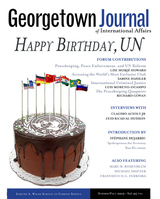
The Georgetown Journal of International Affairs is the official publication of the Edmund A. Walsh School of Foreign Service at Georgetown University. Each issue of the journal provides readers with a diverse array of timely, peer-reviewed content penned by top policymakers, business leaders, and academic luminaries.
The theme of this issue will be a look at the United Nations past, present, and future, to commemorate its 70th anniversary. The secondary theme will be global development.

The Georgetown Journal of International Affairs is the official publication of the Edmund A. Walsh School of Foreign Service at Georgetown University. Each issue of the journal provides readers with a diverse array of timely, peer-reviewed content penned by top policymakers, business leaders, and academic luminaries.

The Georgetown Journal of International Affairs is the official publication of the Edmund A. Walsh School of Foreign Service at Georgetown University. Founded to serve as an academic resource for scholars, business leaders, policymakers, and students of international relations alike, the journal cultivates a dialogue accessible to those with varying levels of knowledge about foreign affairs and international politics.

The international system and the individual nation states that comprise it face crucial decisions regarding both the means and methods employed to supply energy to the globe’s seven billion human inhabitants. Indeed, there are few issues of public policy with as far-reaching implications as those related to energy production, consumption, distribution, and conservation. The extent to which fluctuations in price and supply of this diverse group of resources can have a dramatic impact upon the industry and livelihood of the entire global population cannot be overstated. The Future of Energy seeks to serve as a primer for increasing public dialogue about this incredibly important topic, presenting a diverse array of arguments on issues spanning the gamut of relevance to the current global schema. Resource policies greatly impact the international sphere in economic, political, social, and security contexts and this issue will attempt to demonstrate how these fields of study and practice collide when energy is concerned.
The Georgetown Journal of International Affairs is the official publication of the Edmund A. Walsh School of Foreign Service at Georgetown University. Each issue of the journal provides readers with a diverse array of timely, peer-reviewed content penned by top policymakers, business leaders, and academic luminaries. The Journal takes a holistic approach to international affairs and features a ‘Forum’ that offers focused analysis on a specific key issue with each new edition of the publication, as well as nine regular sections: Books, Business & Economics, Conflict & Security, Culture & Society, Law & Ethics, A Look Back, Politics & Diplomacy, Science & Technology, and View from the Ground.

This issue of the Georgetown Journal of International Affairs focuses on the topic of “Social Media & Social Activism.” While the jury is still out on the degree to which social media has impacted traditional activism, these evolving technologies undoubtedly have transformed modern social movements. Still, we do not wish to suggest that the causal link follows only one direction. Indeed, it will be interesting to observe what future effects social activism will have on the information technology industry as it grapples with the increasing complexities associated with doing business globally—across cultures and government types—in a sector where national laws differ greatly and where international norms are ill-defined or nonexistent. This issue’s Forum considers responses taken and methods employed by major stakeholders, from grassroots activists to state governments to multinational information technology companies.
The Georgetown Journal of International Affairs is the official publication of the Edmund A. Walsh School of Foreign Service at Georgetown University. Each issue of the journal provides readers with a diverse array of timely, peer-reviewed content penned by top policymakers, business leaders, and academic luminaries. The Journal takes a holistic approach to international affairs and features a ‘Forum’ that offers focused analysis on a specific key issue with each new edition of the publication, as well as nine regular sections: Books, Business & Economics, Conflict & Security, Culture & Society, Law & Ethics, A Look Back, Politics & Diplomacy, Science & Technology, and View from the Ground.

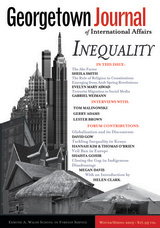
The Georgetown Journal of International Affairs is the official publication of the Edmund A. Walsh School of Foreign Service at Georgetown University. Each issue of the journal provides readers with a diverse array of timely, peer-reviewed content penned by top policymakers, business leaders, and academic luminaries. The Journal takes a holistic approach to international affairs and features a ‘Forum’ that offers focused analysis on a specific key issue with each new edition of the publication, as well as nine regular sections: Books, Business & Economics, Conflict & Security, Culture & Society, Law & Ethics, A Look Back, Politics & Diplomacy, Science & Technology, and View from the Ground.

The Georgetown Journal of International Affairs is the official publication of the Edmund A. Walsh School of Foreign Service at Georgetown University. Each issue of the journal provides readers with a diverse array of timely, peer-reviewed content penned by top policymakers, business leaders, and academic luminaries.
In this issue, the Forum section addresses the plight of international refugees, questions about migration and cultural integration, and assylum policy. Other topics addressed in this issue include US-Iran relations, corruption in Indonesia, Chinese direct investment in Africa, and much more.

The Georgetown Journal of International Affairs is the official publication of the Edmund A. Walsh School of Foreign Service at Georgetown University. Founded to serve as an academic resource for scholars, business leaders, policymakers, and students of international relations alike, the journal cultivates a dialogue accessible to those with varying levels of knowledge about foreign affairs and international politics. Each volume year the journal provides readers with three issues featuring an array of timely, peer-reviewed content that bridges the gap between the work performed by news outlets and that by more traditional academic journals. The first two issues feature a section titled "Forum" that offers focused analysis on a specific key issue, as well as eight regular sections: Books, Business & Economics, Conflict & Security, Culture & Society, Dialogues, Law & Ethics, Politics & Diplomacy, and Science & Technology. The third is a special issue, International Engagement on Cyber. Issue 18.1’s Forum theme is the "global commons," with articles on the Internet as a global public good, the implications of military and security uses of outer space, and international water management challenges.

The 2008 Ossetia War underlined the fact that Georgia is caught in a political struggle between East and West. Per Gahrton analyses American and Russian policy towards the country and provides a firsthand account of the Rose Revolution of 2003, its origin and aftermath.
The book traces the increasing US involvement in Georgia and the Russian reaction of anger, sanctions and, eventually, invasion. Gahrton's analysis is based on interviews with key politicians and his experience as the rapporteur of the European Parliament on South Caucasus. At centre stage is the growing opposition against authoritarian aspects of President Mikheil Saakashvili’s regime and the mysterious death of Prime Minister Zhvania in 2005. The book also asks if the Rose Revolution was a conspiracy or a genuine popular uprising.
This truly authoritative account of Georgia is a must for students studying international relations in the aftermath of The Cold War.

A riveting introduction to the complex and evolving field of geospatial intelligence.
Although geospatial intelligence is a term of recent origin, its underpinnings have a long and interesting history. Geospatial Intelligence: Origins and Evolution shows how the current age of geospatial knowledge evolved from its ancient origins to become ubiquitous in daily life across the globe. Within that framework, the book weaves a tapestry of stories about the people, events, ideas, and technologies that affected the trajectory of what has become known as GEOINT.
Author Robert M. Clark explores the historical background and subsequent influence of fields such as geography, cartography, remote sensing, photogrammetry, geopolitics, geophysics, and geographic information systems on GEOINT. Although its modern use began in national security communities, Clark shows how GEOINT has rapidly extended its reach to other government agencies, NGOs, and corporations. This global explosion in the use of geospatial intelligence has far-reaching implications not only for the scientific, academic, and commercial communities but for a society increasingly reliant upon emerging technologies. Drones, the Internet of things, and cellular devices transform how we gather information and how others can collect that information, to our benefit or detriment.

“Not since Harry Truman succeeded Franklin D. Roosevelt twenty-nine years earlier had the American people known so little about a man who had stepped forward from obscurity to take the oath of office as President of the United States.”
—from Chapter 4
This is a comprehensive narrative account of the life of Gerald Ford written by one of his closest advisers, James Cannon. Written with unique insight and benefiting from personal interviews with President Ford in his last years, Gerald R. Ford: An Honorable Life is James Cannon’s final look at the simple and honest man from the Midwest.

Germany fought three major colonial wars from 1900 to 1908: the Boxer War in China, the Herero and Nama War in Southwest Africa, and the Maji Maji War in East Africa. Recently, historians have emphasized the role of German military culture in shaping the horrific violence of these conflicts, tracing a line from German atrocities in the colonial sphere to those committed by the Nazis during World War II. Susanne Kuss dismantles such claims in a close examination of Germany’s early twentieth-century colonial experience. Despite acts of unquestionable brutality committed by the Kaiser’s soldiers, she finds no direct path from Windhoek, site of the infamous massacre of the Herero people, to Auschwitz.
In German Colonial Wars and the Context of Military Violence Kuss rejects the notion that a distinctive military culture or ethos determined how German forces acted overseas. Unlike rival powers France and Great Britain, Germany did not possess a professional colonial army. The forces it deployed in Africa and China were a motley mix of volunteers, sailors, mercenaries, and native recruits—all accorded different training and motivated by different factors. Germany’s colonial troops embodied no esprit de corps that the Nazis could subsequently adopt.
Belying its reputation for Teutonic efficiency, the German military’s conduct of operations in Africa and China was improvisational and often haphazard. Local conditions—geography, climate, the size and capabilities of opposing native populations—determined the nature and extent of the violence German soldiers employed. A deliberate policy of genocide did not guide their actions.

The contributions presented here include Fredric Jameson’s “Ramblings in Old Berlin,” Günter Grass’s “Lonesome Capitalism,” and Peter Weiss’s “Aesthetics of Resistance.” Among the topics discussed in the volume are the debate over Holocaust memorials in Germany and the significance of their connections to the German past, the problematic continuity that identifies the new unified Germany with the former Federal Republic; the dangers to women posed by the neoliberal project; the legacy of the avant-garde in today’s media theory; Ars nova and Doktor Faustus; nostalgia for the old German Democratic Republic; and reflections on traumatic memory and history as trauma.
Contributors. Ulrich Baer, Michael Geyer, Günter Grass, Frigga Haug, Julia Hell, Fredric Jameson, Juliet Koss, Andreas Michel, Martin Morris, Arkady Plotnitsky, Pierra Vidal-Naquet, Peter Weiss, James E. Young

This is a book about their paradoxical situation and about the dilemmas all advocates of change face when they become powerful enough to negotiate with the status quo. The critical essays by German social scientists and activists also provide a detailed picture of the dynamics of the German Greens -- where their support has come from, the nature of the competing factions, and the place of feminism. The editors provide a substantial introduction.
The flavor and texture of the Greens -- including their raucous public arguments and their innovative campaign tactics -- are suggested by the political posters included in the book and by a whole section of primary documents.
The documents and the essays (except for one originally written in English) have been translated from the German. The result is to make available to English-speaking readers a view of a complex movement whose very name and color have become synonymous with social action in favor of the environment and the empowerment of people.

Many observers have underscored the reemergence of Germany as Europe's central power. After four decades of division, they contend, Germany is once again fully sovereign; without the strictures of bipolarity, its leaders are free to define and pursue national interests in East and West. From this perspective, the reunified Germany faces challenges not unlike those of its unified predecessor a century earlier.
The German Problem Transformed rejects this formulation. Thomas Banchoff acknowledges post-reunification challenges, but argues that postwar changes, not prewar analogies, best illuminate them. The book explains the transformation of German foreign policy through a structured analysis of four critical postwar junctures: the cold war of the 1950s, the détente of the 1960s and 1970s, the new cold war of the early 1980s, and the post-cold war 1990s. Each chapter examines the interaction of four factors--international structure and institutions, foreign policy ideas, and domestic politics--in driving the direction of German foreign policy at a key turning point.
This book will be of interest to scholars and students of German history, German politics, and European international relations, as well as policymakers and the interested public.
Thomas Banchoff is Assistant Professor of Government, Georgetown University.
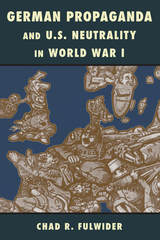
In the fading evening light of August 4, 1914, Great Britain’s H.M.S. Telconia set off on a mission to sever the five transatlantic cables linking Germany and the United States. Thus Britain launched its first attack of World War I and simultaneously commenced what became the war’s most decisive battle: the battle for American public opinion.
In this revealing study, Chad Fulwider analyzes the efforts undertaken by German organizations, including the German Foreign Ministry, to keep the United States out of the war. Utilizing archival records, newspapers, and “official” propaganda, the book also assesses the cultural impact of Germany’s political mission within the United States and comments upon the perception of American life in Europe during the early twentieth century.
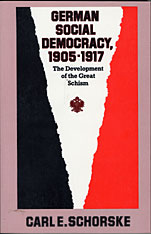

Using documents only recently available, this pioneering book explores the interaction of German, British, French, and American policy at a time when the great depression and the growing political power of the Nazis had created a European crisis—the only such crisis between 1910 and 1941 in which the United States played a leading role.
The author uses contemporary records to rectify the later accounts of such participants as Herbert Hoover, Julius Curtius, and Paul Schmidt. He describes the negotiations of the major powers arising out of the Austro-German plans for a customs union, and relates this problem to the question of terminating reparations and war debts. He shows how the Governor of the Bank of England directed British foreign policy into bitter opposition to France and how the German government sought to exploit the German private debt to Wall Street.
Edward Bennett comes to the conclusion that the Brüning government, contrary to widely held opinion, received fully as much help as it deserved, while the Western powers were already showing the disunity and irresponsibility which proved so disastrous in later years. Although primarily a diplomatic history, this book also offers fresh information on pre-Hitler Germany, MacDonald's Britain, the Hoover administration, and the early career of Pierre Laval.

Moving away from state-centered and Marxist approaches to the study of the European monetary integration process, Karl Kaltenthaler offers a new analytical framework to assess the dynamics within and among the participating countries. Using official and unofficial documents as well as interviews with players ranging from presidents of the Bundesbank to functionaries in the trade unions, Kaltenthaler argues that the number of decision makers negotiating policy and their accountability to interest groups, political parties, government ministries, and Germany’s central bank have made Germany’s fluctuations in policy inevitable. Germany and the Politics of Europe’s Money examines twenty years of German policy through an analysis of four key episodes: the creation of the European Monetary System, the creation of the Franco-German Economic and Financial Council, the establishment of policy toward the European Monetary Union, and the institutional transformation of the EMS in the 1990s. It thus brings a new understanding to Germany’s dynamic policies and the political forces behind them.

Contributors. Kendall L. Baker, Karl H. Cerny, David P. Conradt, Arthur B. Gunlicks, Alice McGillivray, Peter H. Merkl, Ferdinand Muller-Rommel, Helmut Norpoth, Richard M. Scammon, Donald Schoonmaker, Christian Soe

Analyzes the German role in Central American domestic and international relations
Using previously untapped resources including private collections, the records of cultural institutions, and federal and state government archives, Schoonover analyzes the German role in Central American domestic and international relations.Of the four countries most active in independent Central America-Britain, the United States, France, and Germany- historians know the least about the full extent of the involvement of the Germans.German colonial expansion was based on its position as an industrialized state seeking economic well-being and security in a growing world market. German leaders were quick to recognize that ties to the cheap labor of overseas countries could compensate for some of the costs and burdens of conceding material and social privileges to their domestic labor force. The Central American societies possessed limited resource bases; smaller and poorly educated populations; and less capital, communications, and technological development than Germany. They saw the borrowing of development as a key to their social, economic, and political progress. Wary Central American leaders also saw the influx of German industrialists as assurance against excessive U.S. presence in their political economies and cultures.
Although the simplistic bargain to trade economic development for cheap labor appeared to succeed in the short term, complex issues of German domestic unemployment and social disorder filtered to Central American countries and added to their own burdens. By 1929, Germany had recovered most of its pre-World War I economic position.

A new Germany has come of age, as democratic, sophisticated, affluent, and modern as any other western nation. This remarkable transition in little more than a generation is the central theme of Germany Transformed. Here all the old stereotypes and conclusions are challenged and new research is marshalled to provide a model for an advanced democratic republic.
Kendall Baker, Russell Dalton, and Kai Hildebrandt, working with massive national election returns from 1953 onward, explain the Old Politics of the postwar period, which was based on the “economic miracle” and the security needs of West Germany, and the shift in the past decade to the New Politics, which emphasizes affluence, leisure, the quality of life, and international accommodation. But more than elections are examined. Rather, the authors delineate the transvaluation of the German civic culture as democracy became embedded in the nation’s institutions, political ways, party structures, and citizen interest in governance. By the 1970s the quiescent German of Prussia, the Empire, and the 1930s had become the active and aware democratic westerner.
This is among the most important books about West Germany written since the late 1950s, when the nation, devastated by war and rebuilding its economy and political life, was still struggling with the possibilities of democracy. It is a political history, recounted in enormous detail and with methodological precision, that will change perceptions about Germany and align them with realities. Germany is now an integrated part of a democratic western community of nations, and an understanding of its true condition not only illuminates better the staunch European identity but also is bound to have an impact on American policy.

Officials mingled in the lobby of the Oktyabrskaia Hotel--shaking hands, sipping champagne, signing their names--and Germany was united. In this undramatic fashion, the international community closed the book on the drama of divided Germany. But nothing so momentous could be quite so quiet and uncomplicated, as this volume makes strikingly clear. This is the first book to go behind the scenes through access to still not opened archives in many countries. Germany Unified and Europe Transformed discloses the moves and maneuvers that ended the Cold War division of Europe.
Philip Zelikow and Condoleezza Rice, who served in the White House during these years, have combed a vast number of documents and other sources in German and Russian as well as English. They also interviewed the major actors in the drama--George Bush, Hans-Dietrich Genscher, Eduard Shevardnadze, James Baker, Anatoly Chernyayev, Brent Scowcroft, Horst Teltschik, and many others. Their firsthand accounts merge to create a complete, detailed, and powerfully immediate picture of what happened. The book takes us into Gorbachev's world, illuminating why the Soviet leader set such cataclysmic forces in motion in the late 1980s and how these forces outstripped his plans. We follow the tense debates between Soviet and East German officials over whether to crush the first wave of German protesters--and learn that the opening of the Berlin Wall was in fact one of the greatest bureaucratic blunders in human history. The narrative then reveals the battle for the future of East Germany as it took shape between West German Chancellor Helmut Kohl and the reform Communist leader, Hans Modrow--East Germany's "little Gorbachev." Zelikow and Rice show how Kohl and George Bush held off the reactions of governments throughout Europe so that Kohl could awaken East Germans to the possibility of reunification on his terms. Then the battle over the future of the NATO alliance began in earnest.
The drama that would change the face of Europe took place largely backstage, and this book lets us in on the strategies and negotiations, the nerve-racking risks, last-minute decisions, and deep deliberations that brought it off. It is the most authoritative depiction of contemporary statecraft to appear in decades.
READERS
Browse our collection.
PUBLISHERS
See BiblioVault's publisher services.
STUDENT SERVICES
Files for college accessibility offices.
UChicago Accessibility Resources
home | accessibility | search | about | contact us
BiblioVault ® 2001 - 2024
The University of Chicago Press


